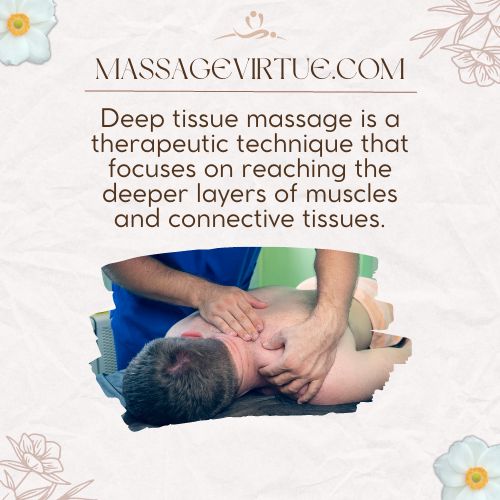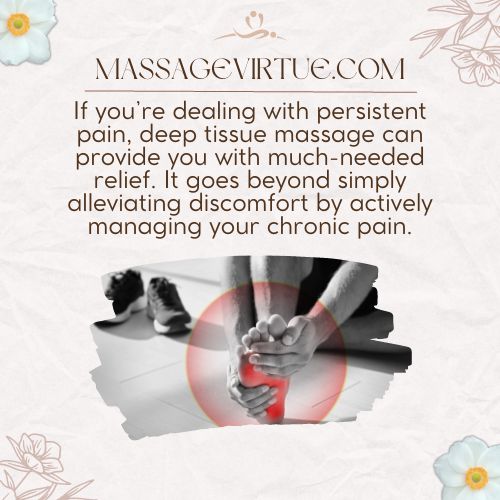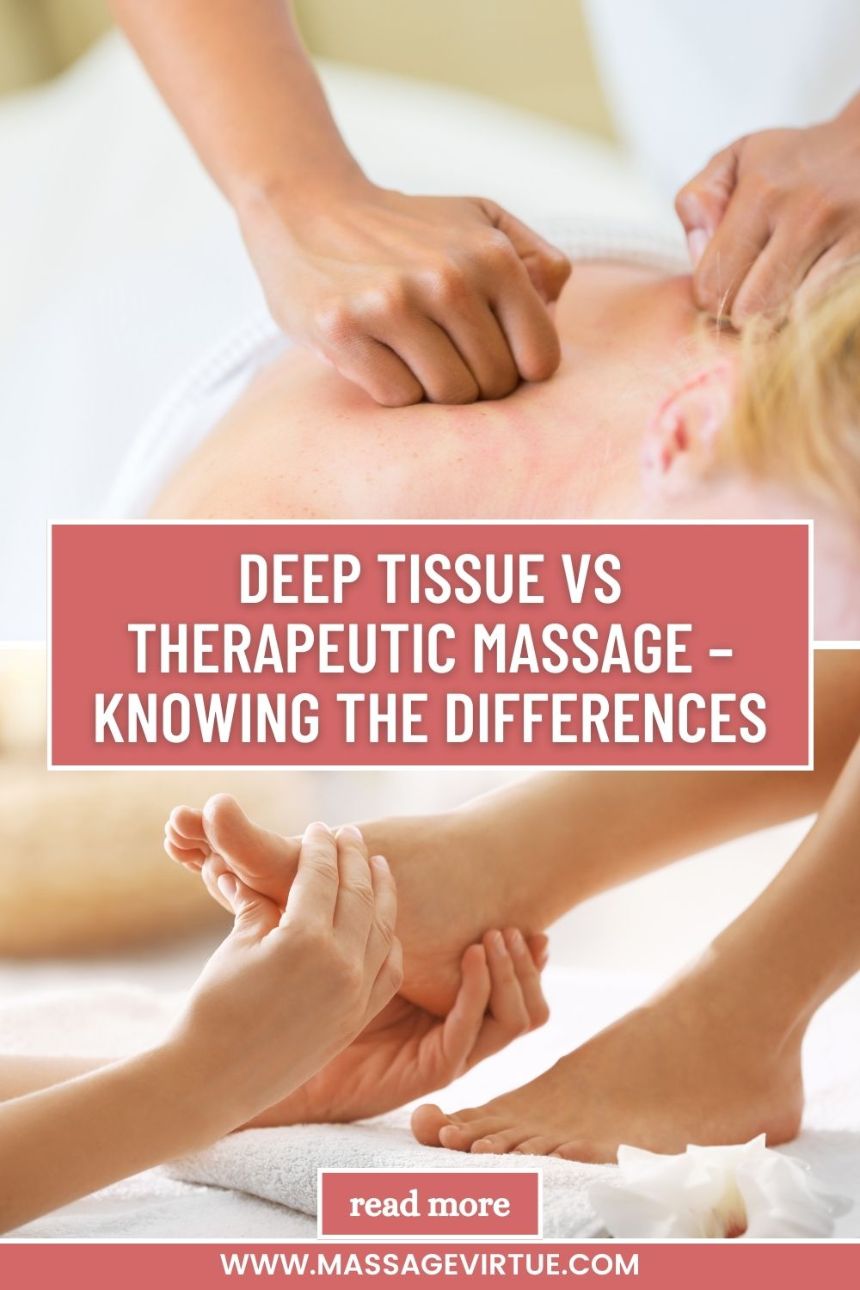Are you looking to unwind, relieve muscle tension, or recover from an injury?
If so, you’ve probably come across two popular massage options: deep tissue massage and therapeutic massage.
These two therapies share some similarities but also have differences that can impact your massage experience.
In this article, we’ll break down the contrasts and benefits of deep tissue and therapeutic massage to help you make an informed decision about which one suits you best.
Deep Tissue Vs Therapeutic Massage – A Comparison
| Aspect | Deep Tissue Massage | Therapeutic Massage |
| Technique | Targets deep muscle layers | Promotes overall well-being |
| Pressure | Firm and intense | Gentle and soothing |
| Target Areas | Specific tension spots | Whole-body relaxation |
| Pain Tolerance | Requires high tolerance | Suitable for all |
| Benefits | Tackles tension, pain, and stress | Focuses on relaxation and mild pain relief |
What is a Deep Tissue Massage?
Deep tissue massage is a massage technique that focuses on realigning deeper layers of muscles and connective tissue. It uses firm pressure and slow strokes to target specific areas of tension.

Deep tissue massage is not your typical relaxing spa treatment. Instead, it’s designed to work on those persistent knots and adhesions that can cause chronic pain and limited mobility.
Deep Tissue Massage Benefits
Deep tissue massage offers various benefits for your physical and mental health. Let’s have a closer look at some of these benefits:
1. Muscle Tension Relief
Deep tissue massage excels at relieving muscle tension.
It tackles those stubborn knots and areas of chronic tension, making you feel like you’re carrying a heavy backpack on your shoulders.
The therapist applies deliberate, firm pressure and slow strokes to reach deep into your muscles, easing tightness and improving flexibility by releasing adhesions and knots.
2. Chronic Pain Management
If you’re dealing with persistent pain, deep tissue massage can provide you with much-needed relief.

It goes beyond simply alleviating discomfort by actively managing your chronic pain.
The technique used in deep tissue massage can break down scar tissue, reducing its impact on your range of motion.
Additionally, it promotes better blood circulation to areas that need healing, helping your body recover naturally.
3. Injury Recovery
Athletes often turn to deep tissue massage to speed up their recovery from sports-related injuries.
The deep pressure applied in this massage stimulates increased blood flow, reducing inflammation around your injured area.
This boost in circulation aids in transporting essential nutrients and oxygen to your damaged tissues, facilitating a quicker healing process.
You can return to your peak performance levels faster and with reduced discomfort.
4. Stress Relief
While deep tissue massage may not be as immediately soothing as some other massage types, it still has remarkable stress-reducing properties.
When your muscles are effectively relaxed through deep tissue massage, your mind tends to follow suit.
By targeting your areas of tension, this massage creates a sense of relaxation and relief.
It’s particularly beneficial for individuals dealing with both physical and mental stress, offering a holistic approach to your well-being.
What is a Therapeutic Massage?
Therapeutic massage, on the other hand, is a more general term that encompasses a wide range of massage techniques tailored to address specific health issues or promote overall well-being.
Unlike deep tissue massage, therapeutic massage isn’t solely focused on deep muscle layers.
This therapy involves various modalities like Swedish massage, Shiatsu, or sports massage, depending on your specific needs.
Therapeutic Massage Benefits
Therapeutic massage is beneficial for your health issues. Let’s explore some of its benefits here:
1. Stress Relief
If you’re seeking pure relaxation, Therapeutic Massage is your go-to choice.
It’s your ticket to releasing the built-up tension throughout your body, allowing you to unwind and destress fully.
The therapist employs gentle, soothing techniques to ease the stress that accumulates in your muscles, leaving you with a deep sense of tranquility.
It’s the perfect escape from the demands of daily life, providing you with a serene moment to rejuvenate.
2. Relaxation
Beyond just stress relief, Therapeutic Massage delivers a serene oasis of calm. It creates an environment of relaxation that envelops both your body and mind.

During the session, you’ll experience a gentle, soothing touch that melts away worries and offers a brief yet rejuvenating escape from the world’s demands.
Therapeutic Massage provides the perfect opportunity to disconnect and recharge.
3. Fascia Care
Therapeutic Massage often incorporates specialized techniques to care for your fascia—the connective tissue surrounding your muscles.
This meticulous attention to your fascia can yield substantial benefits.
It enhances flexibility, improving your overall mobility and reducing the risk of injury.
This personalized approach to fascia care contributes to your physical well-being, making it a great choice for those focused on maintaining or enhancing their physical health.
4. Pain Management
While Therapeutic Massage isn’t as intense as deep tissue techniques, it’s a valuable option for pain management, especially if you’re dealing with mild to moderate discomfort.
Your therapist tailors the session to address your specific needs.
They employ gentle yet effective methods to alleviate your pain. Whether it’s muscle soreness or minor aches, Therapeutic Massage can provide relief, leaving you feeling more comfortable and at ease.
Therapeutic Massage Vs. Deep Tissue Massage – Risks
Let’s take a closer look at the potential risks associated with both types of massage in the table below:
| Risks | Deep Tissue Massage | Therapeutic Massage |
| Soreness | Possible soreness post-massage, especially if you’re not used to deep pressure. | Minimal soreness, if any. |
| Bruising | Occasional bruising in sensitive areas. | Rarely leads to bruising. |
| Discomfort | May be uncomfortable during the massage, especially if you have a low pain tolerance. | Generally gentle and comfortable. |
| Injury Aggravation | Can potentially worsen injuries if not done by a skilled therapist. | Less likely to aggravate injuries. |
Which One is Good For You?
The choice between deep tissue and therapeutic massage ultimately depends on your specific needs and preferences. Here’s a concise guide to help you decide:
- Choose Deep Tissue Massage If:
- You have chronic muscle tension or knots that need focused attention.
- You prefer a massage that addresses deep-seated issues, even if it means some discomfort during the session.
- You’re not prone to bruising, and you’re comfortable with a more intense massage experience.
- Choose Therapeutic Massage If:
- You’re looking for relaxation and stress relief.
- You have a lower pain tolerance or are concerned about post-massage soreness.
- You have injuries or medical conditions that require a gentler approach.
Conclusion
At the end of the day, the choice between deep tissue and therapeutic massage comes down to what your body requires and what you feel most comfortable with.
Remember, both types have their unique benefits, and a skilled massage therapist can customize the experience to meet your specific needs.
FAQs
Should I Get a Deep Tissue or Relaxing Massage?
Your choice depends on your needs. If you have muscle tension or chronic pain, consider deep tissue for targeted relief.
For pure relaxation and stress reduction, opt for a relaxing massage like Swedish.
Who Should Not Get a Deep Tissue Massage?
Individuals with certain conditions should avoid deep tissue massage.
If you have severe osteoporosis, blood clotting issues, or recent surgery, it’s best to skip deep tissue as it involves firm pressure that may not be suitable for these conditions.
What Is Deep Tissue Therapeutic Massage?
Deep tissue therapeutic massage is a technique that focuses on reaching the deep layers of your muscles and connective tissues.
It aims to alleviate muscle tension and chronic pain, and aid in injury recovery by using firm pressure and slow strokes to target specific areas of discomfort.
What Is the Disadvantage of Deep Tissue Massage?
The main disadvantage is potential discomfort during the massage due to the intense pressure applied.
It may not be as soothing as other massage types.
Additionally, it’s not recommended for everyone, especially those with certain medical conditions or a low tolerance for intense pressure.


